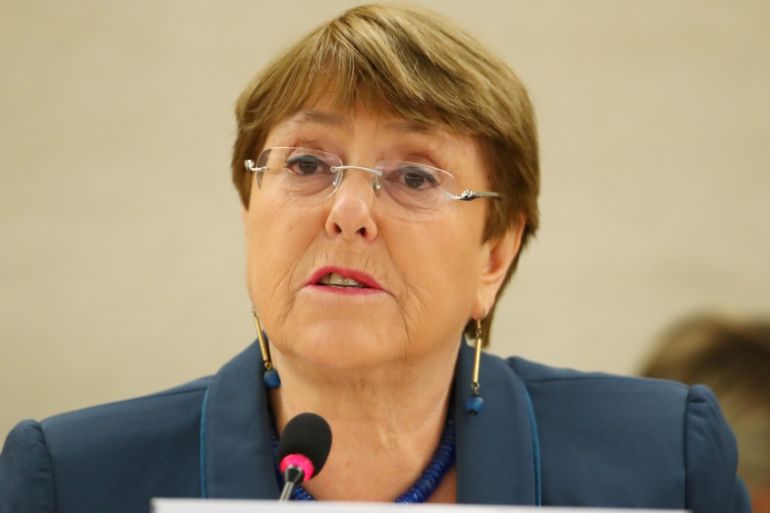UN ‘concerned’ at India arrests of rights activists, NGO curbs
The United Nations High Commissioner for Human Rights appeals to New Delhi to safeguard the rights of human rights defenders and NGOs.

The United Nations human rights chief has urged India to do more to protect human rights activists, who have come under mounting pressure in recent months in the world’s largest democracy.
UN High Commissioner for Human Rights Michelle Bachelet’s office on Tuesday pointed to three “problematic” Indian laws that have led to the arrest of activists and restrictions to the work of non-governmental organisations.
Keep reading
list of 4 itemsIndian police accused of targeting Muslims over anti-CAA protests
The making of a Hindu India
Bilkis: Anti-CAA protester among TIME’s most influential people
Her office lamented “vaguely worded laws that restrict foreign funding” that are increasingly being used to quell voices in civil society, including the Foreign Contribution Regulation Act (FCRA), which prohibits the receipt of foreign funds “for any activities prejudicial to the public interest”.
“The FCRA has been invoked over the years to justify an array of highly intrusive measures,” she said, including “official raids on NGO offices and freezing of bank accounts”.
“I am concerned that such actions based on the grounds of vaguely defined ‘public interest’ leave this law open to abuse, and that it is indeed actually being used to deter or punish NGOs for human rights reporting and advocacy that the authorities perceive as critical in nature,” the former Chilean president said.
Bachelet added that activists and human rights defenders had come under mounting pressure in recent months, particularly those involved in mass protests against the controversial Citizenship Amendment Act (CAA).
Many activists have been arrested under stringent anti-terror law and similar laws for protesting against CAA that fast-tracks naturalisation for some foreign-born religious minorities – but not Muslims.
Rights groups have condemned the arrests as “illegal” and “grave abuse of state power”.
‘Constructive criticism lifeblood of democracy’
“Constructive criticism is the lifeblood of democracy. Even if the authorities find it uncomfortable, it should never be criminalised or outlawed in this way,” Bachelet said in her statement.
Prime Minister Narendra Modi’s government has been accused of viewing most foreign-funded non-profit organisations and rights groups with suspicion.
Last month, advocacy group Amnesty International halted its operation in India, citing alleged reprisals by the government and the freezing of its bank accounts by Indian authorities.
“I urge the government to ensure that no one else is detained for exercising their rights to freedom of expression and peaceful assembly – and to do its utmost, in law and policy, to protect India’s robust civil society,” Bachelet said.
The Indian government rejected Bachelet’s criticism and said “violations of law” could not be “condoned under the pretext of human rights”.
“A more informed view of the matter was expected of a UN body,” Ministry of External Affairs spokesman Anurag Srivastava said.
But critics say India under Modi has grown increasingly intolerant, with a crackdown on dissent unprecedented in scale. Leaders and supporters of the governing Bharatiya Janata Party have routinely labelled dissenters and activists as “anti-nationals”.
More than 1,500 people have reportedly been arrested, Bachelet said, including 83-year-old Catholic priest Stan Swamy – the oldest Indian to be charged with terrorism.